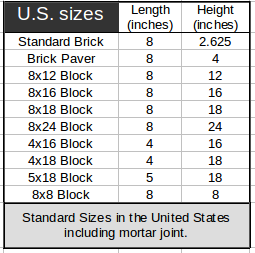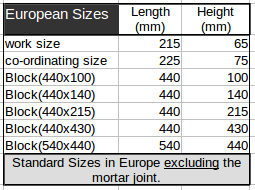Bricks Per Row
The Bricks in a Row calculator computes the number of bricks in a row based on the length of the row and the size of the brick and mortar joint.
INSTRUCTIONS: Choose units and enter the following:
- (L) Length of the Row of Bricks
- (S) Size of the Brick (choose from list)
- (jW) Mortar Joint Width
Bricks in a Row (nB): The calculator returns the number of bricks.
The Math / Science
The Bricks in a Row calculator computes how many whole bricks you need for a row of a specified length, assuming you can cut one brick to accommodate the one or two partial bricks in the row. The algorithm for the bricks in a row is:
- Compute the brick unit length, which is the actual length of the bricks plus the width of a mortar joint.
- Divide the length of the wall by the brick unit length.
- Round up.

Masonry Wall Calculators (Brick, Block, Mortar Joints)
Bricks or Blocks for a Wall: Computes the number of bricks or blocks needed for a wall based on the wall's dimensions and the size of the bricks or block.
- Brick Block Wall Cost: Computes the number of brick or block needed for a wall based on the wall dimensions and the brick or block size, and then applies a cost per unit to the number to estimate the total cost of bricks or blocks.
- Mortar Requirement for Wall: Computes the amount of mortar for a wall based on the dimensions of the wall and the size of the brick or block used.
- Bricks for a House: Estimates the number of bricks needed for a four walled structure (e.g., house) based on the building dimensions, the size of the bricks or blocks and the square footage dedicated to doors and windows.
- Cost of Bricks for a House: Estimates the number of bricks for a four walled structure and applies a unit price per brick or block to estimate the total cost.
- Block for a Foundation: Computes the number of blocks needed for the walls of a foundation based on the dimensions of the foundation and the size of the blocks.
- Cost of Blocks for a Foundation: Estimates the number of block for the wall of a foundation based on the dimensions of the foundation and the size of the blocks, and then applies the unit price per block to provide cost estimate.
- Mortar Needed for Foundation: Estimates the amount of mortar needed for the cinder block walls of a foundation based on the dimensions of the walls, size of blocks, and thickness of the mortar joint.
- Bricks per Row:
 Computes the number of bricks in a row based on the length of the row, the size of the bricks and the width of the mortar joint.
Computes the number of bricks in a row based on the length of the row, the size of the bricks and the width of the mortar joint. - Bricks High: Computes the number of rows of bricks to achieve a height based on the height and the size of the bricks.
- Custom Stone in a Wall: Computes the number of masonry units (stone, block or stone) in a wall based on the dimensions of the wall and the dimensions of the units and the thickness of the mortar joints. It also returns the number of rows needed and the number of stone per row.
- Concrete, Rebar and Forms for Wall:
 Computes the volume of concrete, amount of rebar and the surface area of forms for a concrete wall.
Computes the volume of concrete, amount of rebar and the surface area of forms for a concrete wall. - Price of Delivered Concrete: Computes the price of delivered concrete based on the volume, price per cubic yard, pumping cost, delivery distance, and mileage.
- Water Needed for Concrete: Compute the amount of water needed to make a volume of concrete.
- Concrete Mix: Computes volume and weight of cement, sand, gravel and water requires to make a volume of concrete.
This equation, Bricks Per Row, references 2 pages
Equations and Data Items
This equation, Bricks Per Row, is used in 1 page
Collections
- Comments
- Attachments
- Stats
No comments |
This site uses cookies to give you the best, most relevant experience. By continuing to browse the site you are agreeing to our use of cookies.

